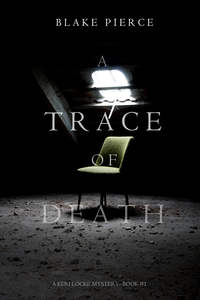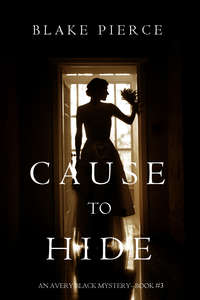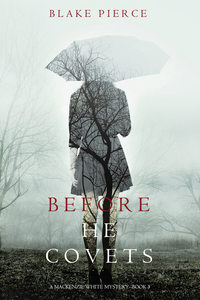
Полная версия
Cause to Run
What made the victim stand out, beyond the nudity and the public display of her death, was the shadow she cast. The sun was up in the east. Her body was slightly angled upward, and it produced a mirror image of her scrunched form in a long, warped shadow.
“Fuck me,” Ramirez whispered.
As Avery did when she was cleaning surfaces in her home, she got down low and glanced at the ship’s bow. The shadow was either a coincidence or a meaningful sign by the killer, and if he’d left one sign, he might have left another. She moved from one side of the ship to the other.
In the glare of the sun, on the white surface of the ship’s bow, right above the woman’s head, between her body and her shadow, Avery spotted a star. Someone had used their finger to draw a star, either in spit or saltwater.
Ramirez called down to O’Malley.
“What did forensics say?”
“Found some hairs on the body. Could be from a carpet. The other team is still over at the apartment.”
“What apartment?”
“The woman’s apartment,” O’Malley called up. “We believe she was abducted from there. No prints anywhere. Guy might have been wearing gloves. How he transferred her here, to a very visible dock, without anyone seeing, we don’t know. He blacked out some of the marina cameras here. Must have been done right before the murder. She was possibly killed last night. Body seems unmolested, but the coroner has to give the final say.”
Holt scoffed at nothing.
“This is a waste of our time,” he snapped at O’Malley. “What can that woman possibly offer that my men haven’t already discovered? I don’t care about her last case or her public persona. As far as I’m concerned she’s just a washed-up attorney who got lucky on her first major case because a serial killer, that she defended in court, helped her!”
Avery stood up, leaned on the railing, and observed Holt, O’Malley, and the two other detectives on the dock. Wind ruffled her jacket and pants.
“Did you see the star?” she asked.
“What star?” Holt called up.
“Her body is angled to the side and up. In the sunlight, it creates a shadow image of her form. Very distinct. Almost looks like two people, back-to-back. Between her body and that shadow, someone drew a star. Could be a coincidence, but the placement is perfect. Maybe we can get lucky if the killer drew it in spit.”
Holt consulted with one of his men.
“Did you see a star?”
“No sir,” replied a lean, blond detective with brown eyes.
“Forensics?”
The detective shook his head.
“Ridiculous,” Holt mumbled. “A drawn star? A child could have done that. A shadow? Shadows are created by light. There’s nothing special about that, Detective Black.”
“Who owns the yacht?” Avery asked.
“A dead end.” O’Malley shrugged. “Bigshot real estate developer. He’s away in Brazil on business. Been gone for the last month.”
“If the boat’s been cleaned in the last month,” Avery said, “then that star was put there by the killer, and since it’s in perfect placement between the body and the shadow, it has to mean something. I’m not sure what, but something.”
O’Malley glanced at Holt.
Holt sighed.
“Simms,” he noted to the blond officer, “get forensics back here. See about that star, and the shadow. I’ll call you when we’re finished.”
Miserably, Holt glanced at Avery, then finally, he shook his head.
“Let her see the apartment.”
CHAPTER THREE
Avery walked slowly down the hall of the dim apartment building, flanked by Ramirez, her heart pounding with anticipation as it always did when entering a crime scene. At this moment, she wished she was anywhere but here.
She snapped out of it. She put her game face on and forced herself to observe every detail, however minute.
The victim’s apartment door was open. An officer stationed outside moved away and allowed Avery and the others to duck under the crime scene tape and enter.
A narrow hallway led to a living room. A kitchen branched off from the hall. Nothing appeared out of the ordinary anywhere; just someone’s very nice apartment. Walls were painted a light gray. There were bookshelves everywhere. Piles of books were stacked on the ground. Plants hung from the windows. A green couch faced a television set. In the only bedroom, the bed was made and topped with a lacy white blanket.
The only obvious disturbance to the apartment was in the living room, where a central rug was clearly missing. A dusty outline, along with a darker space, had been marked with numerous yellow police tags.
“What did forensics find here?” Avery asked.
“Nothing,” O’Malley said. “No prints. No camera shots. We’re in the dark right now.”
“Anything taken from the apartment?”
“Not that we know. Change jar is full. Her clothes were neatly placed in her hamper. Money and ID were still in the pockets.”
Avery took her time in the apartment.
As was her habit, she moved in small sections and observed every section thoroughly – the walls, the floors and wooden floorboards, any trinkets on shelves. A picture of the victim with two female friends stood out. She made a mental note to learn their names and contact each one. The bookshelves and piles were analyzed. There were stacks of female romance novels. The rest were mostly on spiritual subjects: self-help, religion.
Religion, Avery thought.
The victim had a star above her head.
Star of David?
Having observed the dead body on the boat and the apartment, Avery began to form a picture of the killer in her mind. He would have attacked from the hall. The kill was quick and he left no marks, made no mistakes. The victim’s clothing and effects had been left behind in a neat spot, so as not to disturb the apartment. Only the rug was moved, and it was dusty in that area and around the edges. Something about that harked to anger in the killer. If he was so meticulous in every other way, Avery wondered, why not clean the dust from the rug sides? Why take the rug at all? Why not leave everything in perfect condition? She worked it through: He snapped her neck, undressed her, put the clothing away and left everything in order, but then he rolled her in a rug and carried her out like a savage.
She headed over to the window and stared down at the street. There were a few places where someone could hide and observe the apartment without being noticed. One spot in particular called to her: a dark, narrow alleyway behind a fence. Were you there? she asked herself. Watching? Waiting for the right moment?
“Well?” O’Malley said. “What do you think?”
“We have a serial killer on our hands.”
CHAPTER FOUR
“The killer is male, and strong,” Avery went on. “He obviously overwhelmed the victim and had to carry her to the dock. Seems like a personal vendetta.”
“How do you know that?” Holt asked.
“Why go through so much trouble with a random victim? Nothing appears to be stolen so it’s not a robbery. He was precise about everything except that rug. If you spend so much time planning a murder, undressing the victim and putting her clothes in a hamper, why take any of her items? Seems like a planned gesture. He wanted to take something. Maybe to show he was powerful? That he could? I don’t know. And leaving her on a boat? Naked and in full view of the harbor? This guy wants to be seen. He wants everyone to know he made this kill. You might have another serial killer on your hands. Whatever decision you’re going to make about who handles this case,” and she glanced at O’Malley, “you might want to make it quick.”
O’Malley turned to Holt.
“Will?”
“You know how I feel about this,” Holt sneered.
“But you’ll go with the call?”
“It’s a mistake.”
“But?”
“Whatever the mayor wants.”
O’Malley turned to Avery.
“Are you up for this?” he asked. “Be honest with me. You just came off a very high-profile serial murder. The press crucified you every step of the way. Once again, all eyes will be on you, but this time, the mayor is paying special attention. He asked for you specifically.”
Avery’s heart beat faster. Making a difference as a police officer was what she truly loved about her job, but catching serial killers and avenging the dead was what she craved.
“We have a lot of other open cases,” she said. “And a trial.”
“I can give everything to Thompson and Jones. You can oversee their work. If you take this on, this is priority number one.”
Avery turned to Ramirez.
“You in?”
“I’m in.” He nodded in earnest.
“We’ll do it,” she said.
“Good.” O’Malley sighed. “You’re on the case. Captain Holt and his men will deal with the body and the apartment. You’ll have full access to the files and their full cooperation throughout this investigation. Will, who should they go to if they need information?”
“Detective Simms,” he said.
“Simms is the lead detective you saw this morning,” O’Malley relayed, “blond hair, dark eyes, tough all over. The boat and apartment are all being handled by the A7. Simms will contact you directly with any leads on this end. Maybe you should talk with the family for now. See what you can uncover. If you’re right, and this is personal, they may be involved or have some information that can help.”
“We’re on it,” Avery said.
*A quick call to Detective Simms and Avery learned that the victim’s parents lived just a bit further north, outside of Boston in the town of Chelsea.
Breaking the news to families was Avery’s second-most loathed part of the job. Although she had a way with people, there was a moment, right after they learned about a death of a loved one, that complex emotions took hold. Psychiatrists called it the five stages of grieving, but Avery thought of it as slow torture. First, there was denial. Friends and relatives wanted to know everything about the body – information that would only make them grieve more, and no matter how much Avery offered, it was always impossible for the loved ones to imagine. Second came anger: at the police, at the world, at everyone. Bargaining came next. “Are you sure they’re dead? Maybe they’re still alive.” These stages could happen all at once, or they could take years, or both. The last two stages usually happened when Avery was somewhere else: depression and acceptance.
“I have to say,” Ramirez mused, “I don’t like finding dead bodies, but this does free us up to work on this case. No more trial and no more paperwork. Feels good, right? We get to do what we want to do and not have to be bogged down in red tape.”
He leaned over to kiss her cheek.
Avery pulled away.
“Not now,” she said.
“No problem,” he replied with his hands up. “I just thought, you know…that we were a thing now.”
“Look,” she said and had to really think about her next words. “I like you. I really do, but this is all happening too fast.”
“Too fast?” he complained. “We’ve only kissed once in two months!”
“That’s not what I mean,” she said. “Sorry. What I’m trying to say is, I don’t know if I’m ready for a full-blown relationship. We’re partners. We see each other every week. I love all the flirtation and seeing you in the morning. I just don’t know if I’m ready to move further.”
“Whoa,” he said.
“Dan – ”
“No, no.” He raised a hand. “It’s OK. Really. I think I expected that.”
“I’m not saying I want this to end,” Avery reassured him.
“What is this?” he asked. “I mean, I don’t even know! When we’re working, you’re all business, and when I try to see you after work, it’s almost impossible. You were more loving towards me when you were in the hospital than in real life.”
“That’s not true,” she said, but a part of her realized he was right.
“I like you, Avery,” he said. “I like you a lot. If you need time, I’m OK with that. I just want to make sure you actually have some feelings for me. Because if you don’t, I don’t want to waste your time, or mine.”
“I do,” she said and glanced at him for a quick second. “Really.”
“OK,” he said. “Cool.”
Avery kept driving, focusing on the road and on the changing neighborhood, forcing herself to snap back into work mode.
Henrietta Venemeer’s parents lived in an apartment complex just past the cemetery on Central Avenue. From Detective Simms, Avery had learned they were both retired and would most likely be found at home. She hadn’t called in advance. A hard lesson she’d learned early on was that a warning call could alert a possible killer.
At the building, Avery parked and they both walked up to the front door.
Ramirez rang the buzzer.
A long pause ensued before an elderly female answered.
“Yes? Who is it?”
“Mrs. Venemeer, this is Detective Ramirez with the A1 police division. I’m here with my partner, Detective Black. Can we please come up and speak with you?”
“Who?”
Avery leaned forward.
“Police,” she snapped. “Please unlock the front door.”
The door buzzed open.
Avery smiled at Ramirez.
“That’s how you do it,” she said.
“You never cease to amaze me, Detective Black.”
The Venemeers lived on the fifth floor. By the time Avery and Ramirez exited the elevator, they could see an elderly woman peeking out from behind a locked door.
Avery took lead.
“Hi, Mrs. Venemeer,” she said in her softest and clearest voice. “I’m Detective Black and this is my partner, Detective Ramirez.” They both flashed their badges. “Can we come in?”
Mrs. Venemeer had a tangle of wiry hair just like her daughter, only hers was white. She wore thick black glasses and had on a white nightgown.
“What’s this all about?” she worried.
“I think this would be easier if we could talk inside,” Avery said.
“All right,” she mumbled and let them in.
The entire apartment smelled like mothballs and old age. Ramirez made a face and jokingly waved at his nose the moment they entered. Avery hit him in the arm.
A television blared from the living room. On the couch was a large man that Avery assumed was Mr. Venemeer. He was dressed only in red boxers and a T-shirt that he probably wore to bed, and he seemed to have no awareness of them at all.
Oddly, Mrs. Venemeer sat down on the couch beside her husband, without any indication of where Avery or Ramirez might sit.
“What can I do for you?” she asked.
A game show played on the TV. The sound was loud. Every so often, the husband cheered from his seat, settled down, and mumbled to himself.
“Can you turn down the TV?” Ramirez asked.
“Oh no,” she said. “John has to watch his Wheel of Fortune.”
“This is about your daughter,” Avery added. “We really need to talk to you, and we’d like your full attention.”
“Honey,” she said and touched her husband’s arm. “These two officers want to talk about Henrietta.”
He shrugged and growled.
Ramirez turned the television off.
“Hey!” John yelled. “What are you doing!? Turn that back on!”
He sounded drunk.
A bottle of half-filled bourbon was beside him.
Avery stood next to Ramirez and introduced them again.
“Hi,” she said, “my name is Detective Black and this is my partner, Detective Ramirez. We have some very difficult news to share.”
“I’ll tell you what’s difficult!” John snapped. “It’s difficult dealing with a bunch of cops when I’m in the middle of my television program. Turn on that goddamn TV!” he snapped and tried to get out of his seat, but he couldn’t seem to stand.
“Your daughter is dead,” Ramirez said, and he squatted down to look him right in the eyes. “Do you understand? Your daughter is dead.”
“What?” Mrs. Venemeer whispered.
“Henrietta?” John mumbled and sat back.
“I’m so sorry about this,” Avery said.
“How?” the old woman mumbled. “I don’t…no. Not Henrietta.”
“Tell us what you’re talking about!” John scoffed. “You can’t come in here and say our daughter is dead. What the hell do you mean?!”
Ramirez took a seat.
Denial, Avery thought. And anger.
“She was found dead this morning,” Ramirez said, “and identified because of her position within the community. We’re not sure why it happened. Right now, we have a lot of questions. If you can, please just bear with us during this time and help answer some of them.”
“How?” the mother cried. “How did it happen?”
Avery pulled a seat beside Ramirez.
“I’m afraid this is an ongoing investigation. We can’t talk about any specifics at this time. Right now, we just need to know anything that you might know to help us identify her killer. Did Henrietta have a boyfriend? A close friend you might know about? Someone that might have had a grudge against her?”
“Are you sure it was Henrietta?” the mother wondered.
“Henrietta had no enemies!” John shouted. “Everybody loved her. A goddamn saint she was. Came over once a week with groceries. Helped out homeless people. This can’t be right. This has got to be some kind of mistake.”
Bargaining, Avery thought.
“I assure you,” she said, “you’ll both be called later this week to make a positive identification of the body. I know this is a lot to absorb. You’ve just received some terrible news, but please, let’s stay focused on finding out who might have done this.”
“No one!” John blared. “This is obviously a mistake. You have the wrong child. Henrietta had no enemies,” he declared. “Was she hit by a bus? Did she fall off a bridge? At least give us some idea what we’re dealing with here.”
“She was killed,” Avery offered. “That’s all I can say.”
“Killed,” the mother whispered.
“Please,” Ramirez said. “Anything you can think of? Anything at all. Even if it seems insignificant to you, it might be a big help to us.”
“No,” the mother replied. “She had no boyfriend. There’s a circle of girlfriends she keeps. They were over last year for Thanksgiving. None of them could have done something like this. You must be wrong.”
She looked up with pleading eyes.
“You must!”
CHAPTER FIVE
Avery parked at an empty spot on the street between police cruisers and braced herself as she looked over at the A7 police department headquarters on Paris Street in East Boston. Outside the station was a media circus. A news conference had been called to discuss the case and a number of television vans and cameras and reporters barred the way, despite numerous officers trying to get them to move.
“Your public awaits,” Ramirez noted.
Ramirez seemed to want to be interviewed. His head was lifted high and he smiled at every reporter that turned his way. To his disappointment, none of them approached. Avery had her head down and walked as fast as possible to push her way into the station. She hated crowds. At one time in her life, when she was a lawyer, she’d loved when people knew her by name and flocked to her trials, but ever since she herself had been figuratively put on trial by the press, she’d learned to despise their attention.
Instantly, the reporters converged.
“Avery Black,” one of them said with a mic in her face. “Can you please tell us anything about the woman murdered at the marina today?”
“Why are you on the case, Detective Black?” yelled another. “This is the A7. Were you transferred to this department?”
“How do you feel about the mayor’s new Stop Crime campaign?”
“Are you and Howard Randall still an item?”
Howard Randall, she thought. Despite an overwhelming desire to cut all ties with Randall, Avery hadn’t been able to get him out of her mind Every day since her last meeting with Randall, he’d found some way to creep into her thoughts. Sometimes, a simple smell or an image was all she needed to hear his words: “Does it bring back something from your childhood, Avery? What? Tell me…” Other times, while working on different cases, she tried to think like Randall would think to uncover the solution.
“Out of the way!” Ramirez yelled. “Come on! Make room. Let’s go.”
He put a hand on her back and led her into the station.
The A7 headquarters, a large brick and stone building, had recently received a major interior overhaul. Gone were the metal desks and typically sullen feel of a state-operated organization. In its place were sleek silver tables, colored chairs, and an open area for booking that looked more like the entrance to a playland.
Like the A1 – only more modern – the conference room was encased in glass so that people could look out on the floor. A large, oval mahogany table was complete with microphones for each seat and a huge flat-screen TV for conferencing.
O’Malley was already seated at the table beside Holt. On either side of them were Detective Simms and his partner, and two people Avery guessed were the forensics specialist and the coroner. Two seats remained open at the bottom of the table near the entrance.
“Sit down,” O’Malley waved. “Thanks for coming. Don’t worry. I’m not going to be on your backs the entire time,” he said to everyone, with special emphasis to Avery and Ramirez. “I just want to make sure we’re all on the same page.”
“You’re always welcome here,” Holt said with genuine affection toward O’Malley.
“Thanks, Will. Take it away.”
Holt indicated his officer.
“Simms?” he said.
“All right,” Simms said, “I guess I’m on. Why don’t we start with forensics, then get the coroner’s report, and then I’ll tell you about the rest of our day,” he said with emphasis to Captain Holt before he turned to the forensics specialist. “Sound good, Sammy?”
A lean Indian man was the head of their forensics team. He wore a suit and tie and gave a big thumbs-up when his name was mentioned.
“Yes sir, Mark,” he practically gushed. “As we discussed, we have very little to go on. The apartment was clean. No blood, no sign of a struggle. The cameras were all disabled with a clear epoxy that you can buy at any hardware store. We found remnants of black glove fibers, but again, they offered no solid leads.”
Detective Simms kept jerking his chin toward Avery. Sammy had trouble understanding who was in authority. He kept looking at Simms and Holt and everyone else. Eventually, he caught on and began to address Avery and Ramirez.
“We do, however, have something from the shipyard,” Sammy said. “Obviously, the killer disabled the cameras there, in much the same way as the apartment. To get to the shipyard unnoticed would mean he had to work between eleven p.m., which is when the last worker left the marina, and six in the morning, when the first shifts came on. We found matching shoe prints in the shipyard and on the boat before the other police officers were on the scene. The foot is a ten and a half boot, of the Redwing variety. He seems to walk with a limp from a possible injury to his right leg, as the left shoe created a deeper indent than the right.”
“Excellent,” Simms said proudly.
“We checked into that drawn star on the bow as well,” Sammy continued. “No genetic material could be found. However, we did find a black fiber within the star similar to the glove fibers in the apartment, so that was a very interesting connection, thank you for that, Detective Black.” He nodded.
Avery nodded back.
Holt sniffed.
“Lastly,” Sammy concluded, “we believe the body was carried to the shipyard in a rolled rug, as there were many rug fibers on the body and a missing rug from the house.”
He nodded to indicate he was finished.
“Thanks, Sammy,” Simms said. “Dana?”
A woman in a white lab coat, who looked like she would rather have been anywhere else but in that room, spoke next. She was middle-aged, with straight brown hair that came down to her shoulders, and a constant frown on her face.
“The victim died from a broken neck,” she said. “There were bruises on her arms and legs that indicated she was hurled to the floor or against the wall. Body has probably been dead about twelve hours. There was no sign of forced entry.”
She sat back with her arms folded.
Simms raised his brows and turned to Avery.
“Detective Black? Anything on the family?”
“That was a dead end,” Avery said. “The victim saw her parents once a week to bring groceries and cook dinner. No boyfriend. No other close relatives in Boston. She does, however, have a close circle of friends that we’ll have to speak with. The parents themselves aren’t suspect. They could barely get off the couch. We would have begun researching the friends, but I wasn’t sure about protocol,” she said with a look to O’Malley.









